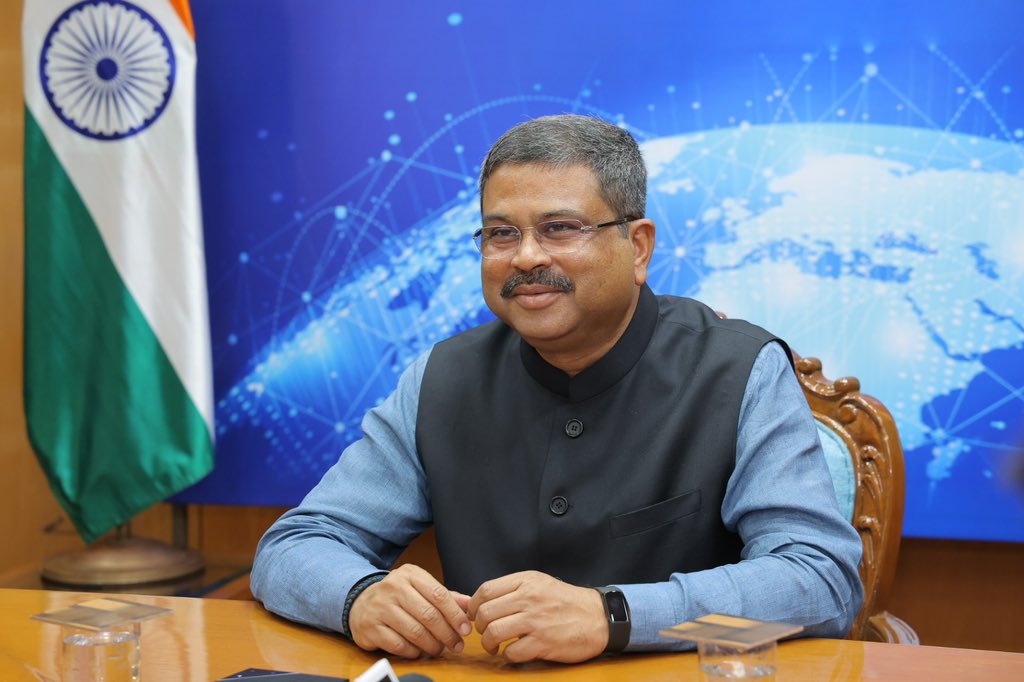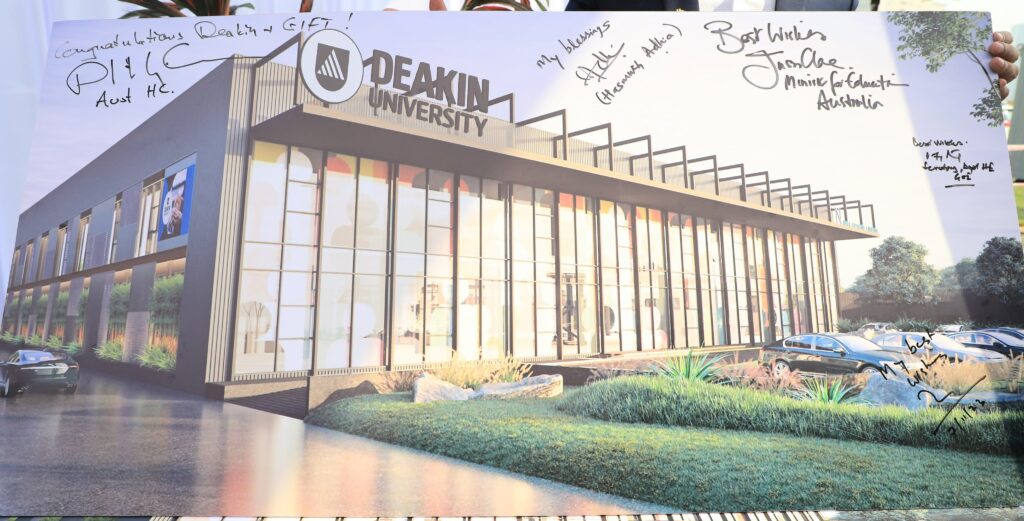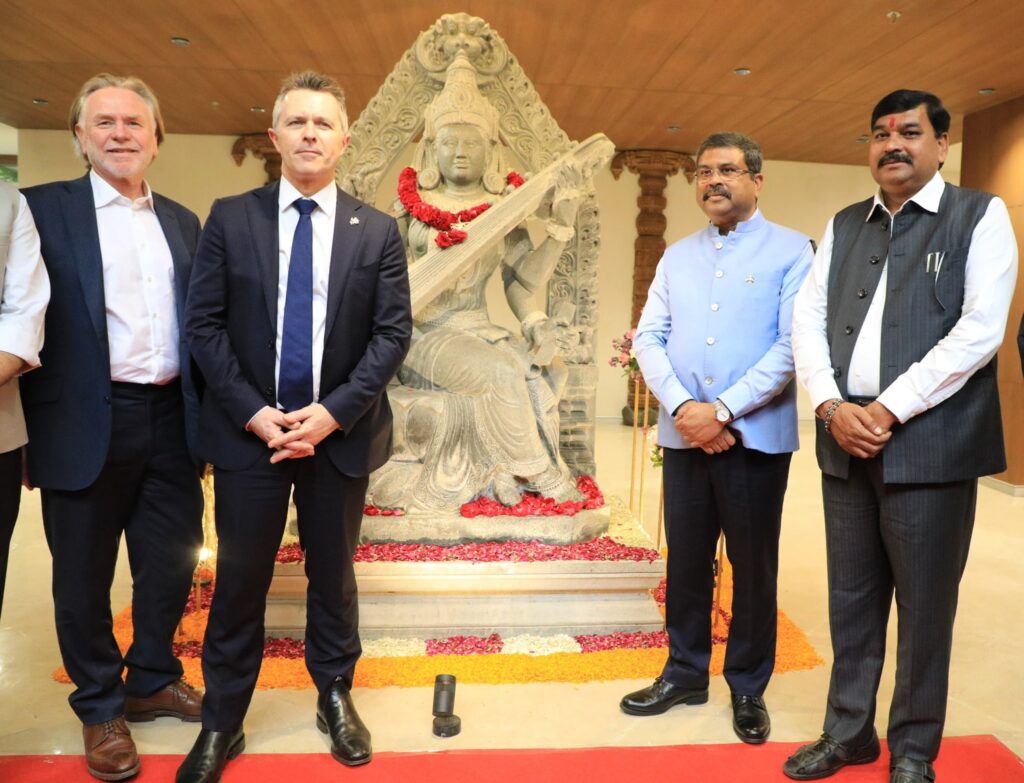- The President of India, Smt Droupadi Murmu addresses the closing ceremony of the Visitor’s Conference 2023
- Higher education institutions in our country have the potential of becoming powerhouses of research and innovations: President Smt Droupadi Murmu
- Education fraternity is committed to build capacity of teachers and educational institutions, empower the Amrit Peedhi with adoption of technology and encourage world-class research- Shri Dharmendra Pradhan
- NCrF and NRF will become a benchmark for the world, especially the Global South – Shri Dharmendra Pradhan
- More than 150 Heads of Educational Institutions such as IITs, NITs, IISERs, NIPER, Central Universities among others attended the Visitor’s Conference
The two-day Visitor’s Conference concluded in New Delhi today. The President of India, Smt Droupadi Murmu addressed the closing ceremony of the Visitor’s Conference 2023 at Rashtrapati Bhavan today (July 11, 2023). Union Education and Skill Development & Entrepreneurship Minister Shri Dharmendra Pradhan, Minister of State for Education Shri Subhas Sarkar, senior officials of the Ministry of Education and more than 150 Heads of Higher Educational Institutions such as IITs, NITs, IISERs, NIPERs, Central Universities among others attended the Visitor’s Conference.
On the second day, the Conference deliberated on the Theme – Education for Sustainable Development: Building a better world. Five different groups brainstormed on sub-themes such as Contributions to the realization of NEP-2020; Internationalization efforts and G-20; Research contributions and recognitions; Diversity, equality, inclusivity and wellness; Plans and action items for Amrit Kaal. The outcome of deliberations was presented before the President.
In her concluding remarks, President Murmu said that the theme and sub-themes of this conference were extremely relevant for our country as well as for the entire world. She noted that the views presented in the Conference are concise and actionable.
The President said that the significance of the policy is proved only in putting it into practice. Outcomes and results prove that the policy has been effectively implemented. For example, through the ‘Digital India’ initiative, a target has been set to digitally empower the Indian society and bring changes in the country’s economy. The results of this initiative have been very impressive. Due to the effective implementation and public participation revolutionary change has been made possible in a very short time. She expressed confidence that similar transformative and inclusive results would be achieved in the field of higher education as well.
Speaking about the sub-theme ‘Research Contributions and Recognitions’, the President said that innovation and cutting edge R&D are among prime movers of economic and social development of a nation. Leading universities and technology institutions in the world have focussed on innovation. They provide an ecosystem that supports Research and Development, which can be applied in industrial and commercial spheres. She said that Higher Education Institutions in our country have the potential of becoming powerhouses of research and innovations. She was happy to note that Higher Education Institutions in India are making the transition towards promoting start-ups, applied research and commercially valuable innovation while preserving the tradition of fundamental research. She expressed confidence that the heads of institutions of higher education would lead their institutions towards promoting innovation that can be used for industrial and commercial purposes.
The President pointed out that developed countries are also known for their higher educational institutions. Students from across the world want to study in higher educational institutions of those countries. She said that such a roadmap has been given in India’s National Education Policy – 2020, following which our higher educational institutions can also become Global Education Centres. She expressed confidence that our higher educational institutions would become centres of world-class knowledge creation.
In his closing remarks, Shri Dharmendra Pradhan emphasized that the education fraternity is committed to build capacity of teachers and educational institutions, empower the Amrit Peedhi with adoption of technology, encourage world class research for global good and also ensure that India takes a quantum leap in Amrit Kaal based on the strong pillars of education. He also highlighted that the National Education Policy 2020 rooted in Indianness and initiatives under NEP, like NCrF and NRF will become a benchmark for the world, especially the Global South.
During the five sessions, Shri Dharmendra Pradhan talked about how the realization of the vision of NEP 2020 demands for collective efforts, shared expertise, common challenges & opportunities and unwavering commitment. Citing Takshashila and Nalanda as international education hubs from ancient times, he emphasized that it is time to resurrect that legacy. He talked about building a new India and its institutions to create a global impact. He commended the detailed discussions on how institutions can push boundaries to integrate research in more strategic areas for growth of society and national development aligning to the roadmap of NEP 2020. Shri Pradhan highlighted how mental and emotional well-being positively impacts motivation, focus and resilience among students and by promoting well-being, institutions can provide students with tools and resources to prosper on campus and in life. He also emphasized that high-quality education can only be ensured by high-quality teaching which will be possible when institutions handhold and mentor each other through collective effort.
Prof. Mamidala Jagadesh Kumar, Chairman, University Grants Commission headed the panel discussion on ‘Contributions to the realization of NEP-2020’. In this session, a summary of all efforts taken by the Ministry of Education were presented followed by case studies of successful/ ongoing implementation of the same by the different institutions. It featured presentations by Prof. Abhay Karandikar, Director, IIT, Kanpur and Prof. T.V. Kattimani, Vice Chancellor, Central Tribal University of Andhra Pradesh. The session was observed and moderated by Prof. Santishree Dhulipudi Pandit, Vice Chancellor, JNU. It was discussed that higher educational institutions need to emphasize more and more on technology integration. National digital university (e-vishwavidyalaya) is expected to make quality education accessible to a large section for our country. While many institutions have taken steps towards internationalization, there is a need of increasing academic collaboration with top universities in the world and attracting foreign students to study in India. Our institutions need to enhance our research capabilities further and create a vibrant ecosystem of innovation and incubation that contributes towards a self-reliant nation.
Session-2 was on ‘Internationalization efforts and G20’ and the panel was headed by Prof. Sudhir K. Jain, Vice-Chancellor, Banaras Hindu University. The session featured two presentations; Prof. Rangan Banerjee, Director of IIT Delhi, gave a presentation on internalization efforts, successes, challenges, and the way forward. Prof. K. Umamaheshwar Rao, Director of NIT Rourkela, provided valuable insights on the Study in India program, emphasizing opportunities, challenges, and the path ahead for internationalisation, with Prof. Pramod K. Jain, Director, IIT (BHU, Varanasi) observing and moderating the session. The session discussed the opportunities and challenges before our institutions as they work to enhance their global engagements. Valuable suggestions were given on ways to promote two-way mobility of international students and faculty, enhance research collaborations, build the international image of our institutions and strategize our efforts to place India at the forefront of the global education ecosystem.
Session-3 was on ‘Research contributions and recognitions’. Prof. K. Radhakrishnan, Former Chairman, Space Commission / Secretary, Department of Space and Chairman, ISRO headed the panel. This session elaborated on some of the outstanding research contributions of the faculty and students during the academic year 2022-23. The session also provided details of individuals and groups awarded for their contribution with a brief of their contributions. It also highlighted that many institutions were recognized and awarded the status of Institution of Eminence and substantial funding provided resulting in positive changes. Prof. Govindan Rangarajan, Director of IISc Bangalore and Prof. Basuthkar J. Rao, Vice Chancellor, University of Hyderabad gave notable presentations. The panel was moderated by Prof. Najma Akhtar, Vice Chancellor, Jamia Millia Islamia. The rapidity of the advancement in science and technology was highlighted and exemplified by the concepts of ‘Disruptive Technologies’ and ‘Fourth Industrial Revolution’ 4IR that were coined in the past decade, as discussed. There was also a mention of the collective global campaign for sustainable development goals, SDG 2030, emphasizing the growing global concern about climate change and impending natural hazards. Ensuring excellence and relevance in research was marked as an imperative national need and a right demand in our academic and R&D fraternity.
Session-4 was on Diversity, Equality, Inclusivity and Wellness and the panel was headed by Prof. V. Kamakoti, Director, IIT-Madras. This session discussed all efforts taken by institutions on DEI and wellness efforts. The DEI efforts included reduction of gender bias, ensuring ease of living for physically challenged steps to improve participation of women in leadership roles. Prof. Santanu Bhattacharaya, Director of IISER Tirupati and Prof. Prasad Krishna, Director of NIT Calicut gave insightful presentations on the theme of the session. The session was moderated by Prof. Prabha Shankar Shukla, Vice Chancellor, NEHU. The deliberations brought out a wide range of suggestions on how to ensure the happiness, well-being and development of our students and faculty. The focus of the discussion also included the role of Higher Educational Institutions in improving the Gross Enrolment Ratio as envisaged by the National Education Policy and reducing the dropout rates.
Session-5 was on ‘Plans and action items for Amrit kaal’ and the panel was headed by Shri T.G. Sitharam, Chairman, AICTE. This session focused on the strategic plans of the Institutions with emphasis on entrepreneurship and innovation. The central idea was “India as a Technology super power in 2047”. The session talked about the public policy workshop, success stories of startups and National Missions including Supercomputing, Cyber Physical Systems, Semiconductor etc. and the role of academia. Prof. Rajat Moona, Director, IIT Gandhinagar and Prof. Yogesh Singh, Vice Chancellor of University of Delhi, discussed measures taken to ensure high-quality education and the leadership for the next 25 years. They also shared best practices from IITs and DU, with the session being observed and moderated by Prof. Rajeev Ahuja, Director, IIT Ropar. In this session, the discussions focused on how the education system of India is poised for tremendous growth suitably fuelled by NEP 2020. New programs, which are cross-disciplinary in nature and are suitable for the demands of industry and society are being introduced by most institutions of higher education. A suitable bias-free accreditation and assessment system, transparent ranking system with “peer sourcing” for validation of data will further enhance the quality of the Indian Education system.
The President of India inaugurated the Visitor’s Conference 2023 at Rashtrapati Bhavan on 10th July, 2023. In her inaugural address, the President said that education is vital for the progress of the individual, society and country, stating that providing equitable and inclusive higher education to youth coming from socially and economically disadvantaged groups is one of the priorities of the National Education Policy- 2020. She met with the Heads of Educational Institutions, on the sidelines of the Visitor’s Conference 2023.
A group of eminent Alumni/Benefactors also called on the President, at Rashtrapati Bhavan last evening on the sideline of the Visitor’s Conference 2023. During the interaction, the President appreciated the benefactors for their contribution to the cause of education and society. Union Minister Shri Dharmendra Pradhan was also present. Shri Rakesh Gangwal, Co-Founder of Indigo Airlines; Shri Muktesh Pant, Former CEO of Yum China; Shri Subroto Bagchi, Co-founder of Mindtree; Prashanth Prakash, Co-Founder and Partner, Accel India; Dr. Shridhar Shukla, Co-Founder, Chairman, KPOINT Technologies; Rizwan Koita, Co-Founder and CEO of CitiusTech; Shri Vikram Gupta, Founder and Managing Partner, IvyCap Ventures Advisors Pvt. Ltd; Shri T.T. Jagannathan, Chairman of TTK Prestige; Shri Nemish Shah, Co-Founder of ENAM and Board of Governor of FLAME University; Smt Roshni Nadar, Chairperson of HCL Technologies and Trustee of Shiv Nadar University; and Shri Ajay Piramal, Chairman of the Piramal Group attended the interaction along with their spouse.
The President also conferred the Visitor’s Awards 2021 at the inauguration ceremony last evening. The Visitor’s Award for ‘Innovation’ was conferred on Prof. Venktesh Singh from the School of Physical and Chemical Sciences, Central University of South Bihar for developing indigenous Charge Pick-up Panels for Resistive Plate Chamber Detector using Silicon Fiber Sheet. The Visitor’s Award for ‘Research in Physical Sciences’ was presented to Prof. Surajit Dhara from the School of Physics, University of Hyderabad for his work in soft matter and liquid crystals. Prof. Mohammed Latif Khan from Dr Harisingh Gour Vishwavidyalaya, Sagar received the Visitor’s Award for ‘Research in Biological Sciences’ for his contributions in understanding of forest biodiversity, regeneration of RET (Rare, Endangered and Threatened) plant species and threat status assessments of forests in the Eastern Himalayas and Central India. The Visitor’s Award for ‘Technology Development’ was conferred on Prof. KC James Raju from the School of Physics, University of Hyderabad for his contributions in frequency tunable microwave devices using ferroelectric thin films. The President also presented the Visitor’s Award, 2020 for ‘Research in Physical Sciences’ to Prof. Anunay Samanta, School of Chemistry, University of Hyderabad for his research contributions to the spectroscopy and dynamics of short-lived chemical species formed on photo-excitation of molecular systems and materials.



